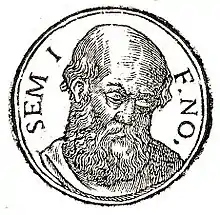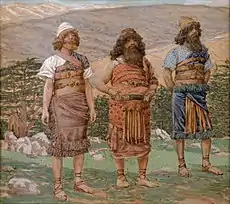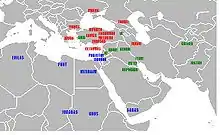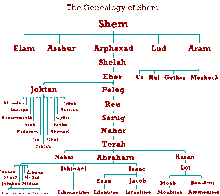Shem
Shem (/ʃɛm/; Hebrew: שֵׁם Šēm; Arabic: سام, romanized: Sām[lower-alpha 1]) was one of the sons of Noah in the Hebrew Bible as well as in Islamic literature.
Shem | |
|---|---|
 Shem, son of Noah | |
| Children | Elam Ashur Arphaxad Lud Aram |
| Parent(s) | Noah |

The children of Shem were Elam, Ashur, Arphaxad, Lud and Aram, in addition to daughters. Abraham, the patriarch of the Hebrews and Arabs, was one of the descendants of Arphaxad.
Islamic literature describes Shem as one of the believing sons of Noah. Some sources even identify Shem as a prophet in his own right and that he was the next prophet after his father.[1]
Shem is mentioned several times in Genesis 5-11[2] as well as 1 Chronicles 1:4.


In the Bible
Genesis 10
Genesis 10:21 refers to relative ages of Shem and his brother Japheth, but with sufficient ambiguity to have yielded different English translations. The verse is translated in the King James Version as: "Unto Shem also, the father of all the children of Eber, the brother of Japheth the elder, even to him were children born." However, the New American Standard Bible gives: "Also to Shem, the father of all the children of Eber, and the older brother of Japheth, children were born".
According to Genesis 10:22-31 (Jewish Publication Society Translation of 1917):
- 22 The sons of Shem: Elam, and Asshur, and Arpachshad, and Lud, and Aram. 23 And the sons of Aram: Uz, and Hul, and Gether, and Mash. 24 And Arpachshad begot Shelah; and Shelah begot Eber. 25 And unto Eber were born two sons; the name of the one was Peleg; for in his days was the earth divided; and his brother's name was Joktan. 26 And Joktan begot Almodad, and Sheleph, and Hazarmaveth, and Jerah; 27 and Hadoram, and Uzal, and Diklah; 28 and Obal, and Abimael, and Sheba; 29 and Ophir, and Havilah, and Jobab; all these were the sons of Joktan. 30 And their dwelling was from Mesha, as thou goest toward Sephar, unto the mountain of the east. 31 These are the sons of Shem, after their families, after their tongues, in their lands, after their nations. 32 These are the families of the sons of Noah, after their generations, in their nations; and of these were the nations divided in the earth after the flood.
Genesis 11
Genesis 11:10 records that Shem was 100 years old at the birth of Arphaxad, two years after the flood; and that he lived for another 500 years after this, making his age at death 600 years.
Excerpts from Genesis 11:10-27— (Jewish Publication Society translation of 1917):
- 'Shem was a hundred years old, and begot Arpachshad two years after the flood. ... Arpachshad lived five and thirty years, and begot Shelah. 13 And Arpachshad lived after he begot Shelah ... Shelah lived thirty years, and begot Eber. ... Eber lived four and thirty years, and begot Peleg. ... Peleg lived thirty years, and begot Reu. ... Reu lived two and thirty years, and begot Serug. '... Serug lived thirty years, and begot Nahor. ... Nahor lived nine and twenty years, and begot Terah. ... Terah lived seventy years, and begot Abram, Nahor, and Haran. ... and Haran begot Lot.
In Jewish sources
The 1st-century historian Flavius Josephus told a legendary, non-scriptural account that Shem's five sons were the progenitors of the nations of Elam, Assyria, Chaldea, Lydia, and Levantine, respectively.[3]
According to some Jewish traditions (e.g., B. Talmud Nedarim 32b; Genesis Rabbah 46:7; Genesis Rabbah 56:10; Leviticus Rabbah 25:6; Numbers Rabbah 4:8.), Shem is believed to have been Melchizedek, King of Salem, whom Abraham is recorded to have met after the Battle of the Four Kings.
A rabbinic document that surfaced in the 17th century, claiming to be the lost Book of Jasher, provides some names not found in any other source.
In Islam
Sunni Islam
Shem is regarded by scholars to be the successor to Noah, receiving prophetic knowledge, enlightenment, and leadership of his people. Shem was also one of the people whom God made Jesus resurrect as a sign to the Children of Israel.[4] Early Islamic historians like Ibn Ishaq and Ibn Hisham always included Shem's name in the genealogy of Muhammad.[5]
Shi'a Islam
In a Shiite tradition Imam Ja'far al-Sadiq has narrated to his companions that Jibrael visited Noah close to the time of his death, relaying God's message: "Oh Noah! Your prophethood has expired and your days are complete, so look to the Great Name, the inheritance and effects of the knowledge of prophethood, and hand these over to your son, Sam (Shem), for I do not leave the Earth except that there is a knowledgeable one by which obedience to Me (God) can be recognized..."[6]
Family tree
The following family tree contains information from the Hebrew Bible, without data from any other sources. According to Luke 3, an additional figure named Cainan is the son of Arpachshad and the father of Shelah.
| Shem | |||||||||||||||||||||||||||||||||||||||||||||||||||||||||||
| Elam | Ashur | Arpachshad | Lud | Aram | |||||||||||||||||||||||||||||||||||||||||||||||||||||||
| Salah | Uz | Hul | Gether | Mash | |||||||||||||||||||||||||||||||||||||||||||||||||||||||
| Eber | |||||||||||||||||||||||||||||||||||||||||||||||||||||||||||
| Peleg | Joktan | ||||||||||||||||||||||||||||||||||||||||||||||||||||||||||
| Reu | |||||||||||||||||||||||||||||||||||||||||||||||||||||||||||
| Almodad Sheleph Hazarmaveth Jerah Hadoram Uzal Diklah Obal Abimael Sheba Ophir Havilah Jobab | |||||||||||||||||||||||||||||||||||||||||||||||||||||||||||
| Serug | |||||||||||||||||||||||||||||||||||||||||||||||||||||||||||
| Nahor | |||||||||||||||||||||||||||||||||||||||||||||||||||||||||||
| Terah | |||||||||||||||||||||||||||||||||||||||||||||||||||||||||||
| Abraham | Sarah | Nahor | Haran | ||||||||||||||||||||||||||||||||||||||||||||||||||||||||
See also
Notes
- Greek: Σήμ Sḗm; Ge'ez: ሴም, Sēm
References
- Scott B. Noegel and Brannon M. Wheeler (2002). "Shem". In the Historical Dictionary of Prophets in Islam and Judaism. p. 301
- Genesis 5:32, 6:10; 7:13; 9:18,23,26-27; 10; 11:10
- Flavius Josephus, Antiquities of the Jews, trans. William Whiston (University of Cambridge, 1737): book 1, ch. 6, v. 4; online at https://penelope.uchicago.edu/josephus/ant-1.html
- Stories of the Prophets, Ibn Kathir, Story of Jesus
- Ibn Ishāq, Sīrat Rasūl Allāh, tr. A. Guillaume (Oxford: Oxford University Press, 2004), p. 3
- al-Kulayni, Muhammad ibn Ya‘qūb (2015). Al-Kafi (Volume 8 ed.). NY: Islamic Seminary Incorporated. ISBN 9780991430864.
Bibliography
- Kishik, David (2018). The Book of Shem: On Genesis before Abraham. Stanford University Press. ISBN 9781503606760.
External links
| Look up Shem in Wiktionary, the free dictionary. |
- Herbermann, Charles, ed. (1913). . Catholic Encyclopedia. New York: Robert Appleton Company.